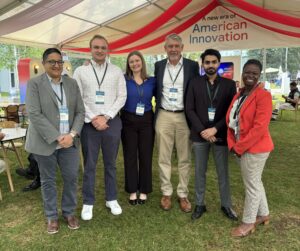Attending the Aspen Security Forum: Connecting Theory to Practice

From July 15–18, I had the privilege of representing the Josef Korbel School of Global and Public Affairs as part of a student delegation at the 2025 Aspen Security Forum. As the only university partnered with the Forum, Korbel’s presence stood out—we were proud to be the only students attending among a distinguished gathering of world leaders, policymakers, and experts in global security.
The forum was insightful, exposing me to a wide range of opinions on pressing global issues. A recurring theme throughout the event was the growing role of artificial intelligence and cybersecurity in international security. In the session Cracking the Code: AI and National Security, we heard from Tarun Chhabra, Head of National Security at Anthropic and Distinguished Visiting Fellow at the Hoover Institution, Stanford University, and Katrina Mulligan from OpenAI for Government. These speakers, representing both public and private sectors, discussed how AI is poised to transform the security landscape. As an international security student, I was deeply intrigued by these discussions.
Another recurring theme was the future of European defense. A powerful session on this topic featured Baiba Braže, Minister of Foreign Affairs of Latvia. Following the discussion, our Korbel delegation had the privilege of engaging with the Latvian delegation, who kindly invited us to the upcoming Rīga Conference. Korbel also hosted a session at the Forum titled Russia, Ukraine, and Beyond. This session explored the geopolitical and defense implications of the Russia-Ukraine war and featured a remarkable lineup of speakers: Dr. Condoleezza Rice—Korbel alum and former U.S. Secretary of State—Pasi Rajala, Political State Secretary for Finland’s Foreign Ministry, and Halyna Yanchenko, Member of Ukraine’s Parliament and Head of the Investment Taskforce for the Defense Industry. The discussion emphasized the enduring importance of transatlantic partnerships and the need for sustained global support for Ukraine. It was a proud moment when Dr. Condoleezza Rice recognized Dean Fritz Mayer and the Korbel School for organizing the session.
The forum also came at a pivotal moment for Middle Eastern geopolitics. The session titled Israel at a Crossroads featured Amos Yadlin, former Chief of the IDF Intelligence Directorate, and Michael Herzog, former Israeli Ambassador to the U.S. and Tisch Distinguished Fellow at the Washington Institute for Near East Policy. They discussed Israel’s evolving strategic posture and described its military doctrine as one of “short, decisive, and limited war.” I appreciated that the forum also provided an alternative narrative through Dr. Vali Nasr’s book talk on Iran's Grand Strategy: A Political History. His presentation offered a deep dive into Iran’s domestic politics and its shifting strategic paradigms. Dr. Nasr argued that, in contrast to Israel’s doctrine, Iran’s strategy is oriented toward long-term, less decisive conflicts. These sessions together provided a comprehensive and nuanced understanding of regional dynamics.
One of the most fascinating sessions for me was Great Power Competition – Global POVs. This panel offered compelling perspectives from the Global South and included speakers such as Hina Rabbani Khar, Former Foreign Minister of Pakistan; Claudia Ruiz Massieu, Former Foreign Minister of Mexico; and Balázs Orbán, Political Director to the Hungarian Prime Minister. It was especially insightful to hear how different regions interpret great power dynamics—and why including these voices is crucial for shaping inclusive global policy.
Outside the formal sessions, I, along with other Korbel students, was invited to informal networking opportunities. These provided a chance to connect with professionals working in tech, defense, and government. As someone who aspires to work in think tanks, especially in Washington, D.C., I was excited to meet individuals from the Atlantic Council, Aspen Institute, Center for a New American Security, and Delphi Global. Many of them were already familiar with the Korbel School and expressed willingness to support me and my fellow students in our career journeys. Beyond these professionals, I also met a Stanford graduate who had recently founded an AI company supporting semiconductor development. These connections helped me not only network professionally but also draw inspiration from fellow academics and innovators.
I returned from Aspen with a new perspective on global security issues and a wealth of connections. I truly felt that this opportunity, along with the Korbel School, provided a bridge between theoretical knowledge and real-world practice. I am deeply grateful to Dean Fritz Mayer, Prof. Naazneen Barma, and the Scrivner Institute of Public Policy for providing this opportunity. Experiences like this are a powerful reminder of how the Korbel School continues to empower students like me to connect academic learning with real-world policy and practice.

